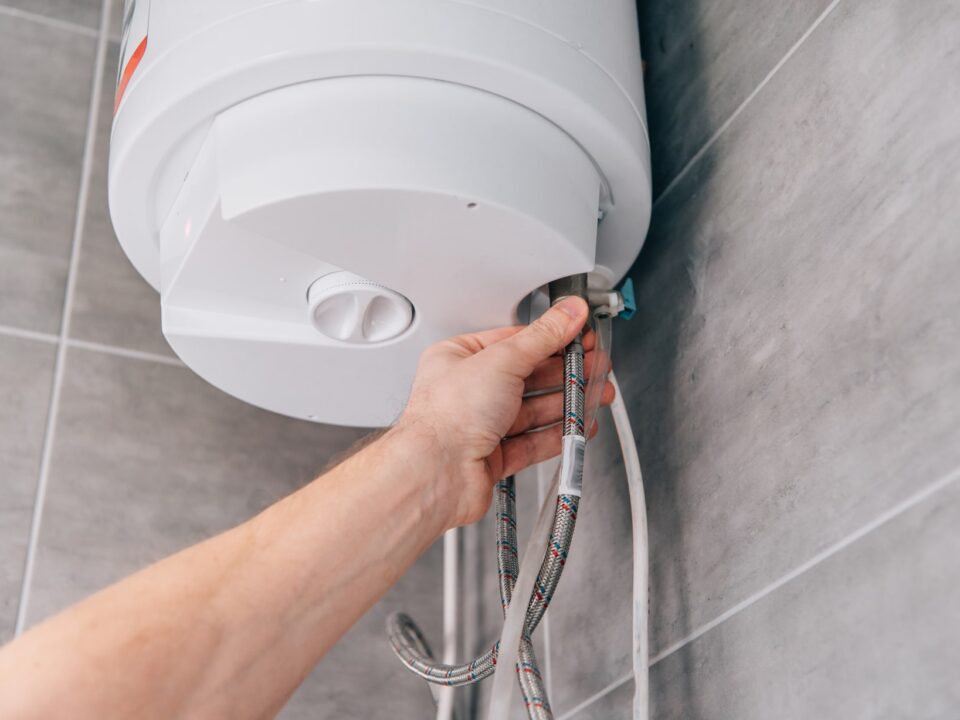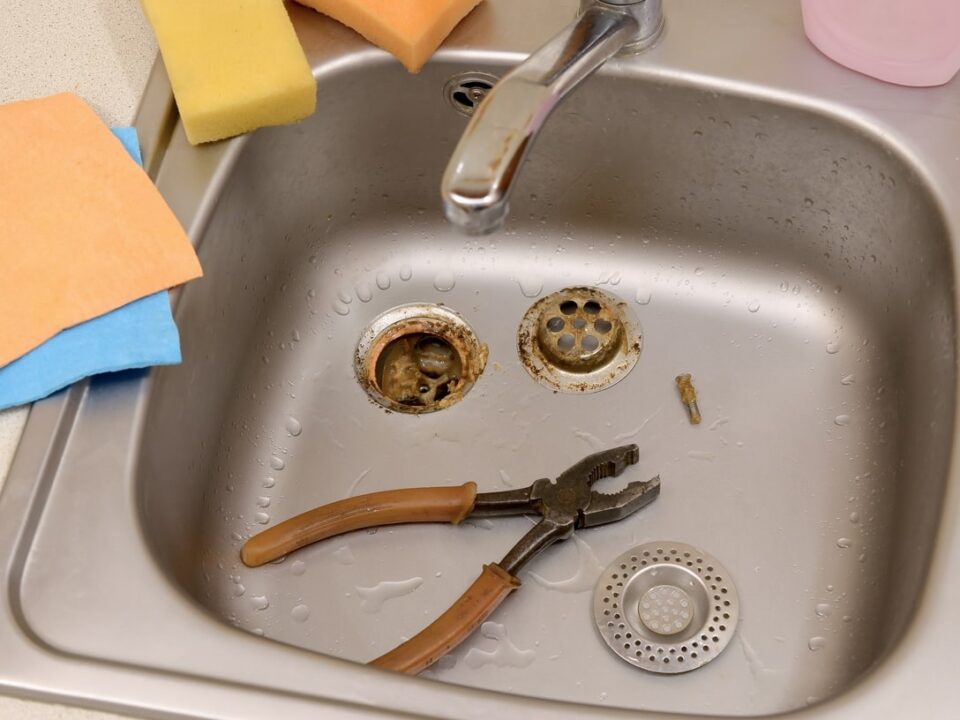
Tips for Fixing a Humming Garbage Disposal
December 27, 2023
The Lifespan of Pipes in Florida: How Long Do Copper and Polybutylene Pipes Last?
February 6, 2024Is your garbage disposal making an unusual humming sound and refusing to do its job? You’re not alone. Garbage disposals are a convenient and essential appliance in many homes, but they can encounter issues that cause them to only hum instead of grinding up food waste.
In this comprehensive guide by Babe’s Plumbing, Inc. & Fire Sprinklers, we will explore what a garbage disposal is, how it works, what causes it to only hum, and most importantly, how to fix it. We’ll cover common issues like jammed disposal blades, faulty motors, and clogged drains, and provide practical steps to troubleshoot and resolve these problems. We’ll discuss preventive measures to keep your garbage disposal running smoothly and know when it’s time to call in a professional. So, if you’re tired of dealing with a humming garbage disposal, keep reading to find the solutions you need to restore its functionality and prevent future troubles.
What Is a Garbage Disposal?
A garbage disposal, also known as a disposal unit, is installed under a kitchen sink to shred food waste into small pieces, allowing it to pass through plumbing without clogging.
This kitchen appliance plays a crucial role in managing food waste by breaking down leftovers and scraps, reducing odor, and improving overall kitchen cleanliness. By preventing food waste from entering the plumbing system, garbage disposals help to minimize the risk of clogged pipes and costly maintenance issues.
Regular use of a garbage disposal can also contribute to environmentally friendly practices by decreasing the amount of organic waste sent to landfills.
How Does a Garbage Disposal Work?
A garbage disposal works by using a motor to rotate sharp blades that grind food waste into small particles, which are then flushed through the plumbing and into the municipal sewer system. This process helps to prevent clogging in the kitchen sink and reduces the amount of organic waste that ends up in landfills.
The motor provides the power needed to drive the blades, which are designed to efficiently break down food scraps. Once the waste is ground into smaller particles, it can easily pass through the plumbing system without causing blockages.
The seamless integration of the motor, blades, and plumbing ensures effective disposal of food waste, contributing to a cleaner and more sustainable environment.
What Causes a Garbage Disposal to Only Hum?
A garbage disposal may only hum due to various issues such as jammed disposal blades, a faulty motor, or a clogged drain, impacting its operational efficiency and requiring troubleshooting.
Jammed disposal blades can obstruct the rotation, leading to a humming sound. A faulty motor might struggle to turn the disposal’s blades, resulting in the hum.
Clogged drains can restrict the flow of waste, causing the disposal to emit sound. To fix these issues, it is essential to inspect the disposal, identify the root cause, and repair or replace the affected components accordingly. Regular maintenance can also prevent such problems, ensuring smooth functioning and minimal disruptions.
Jammed Disposal Blades
Jammed disposal blades can impede the grinding process of garbage disposal, leading to a humming sound and potential motor strain, requiring immediate attention to restore its functionality.
This issue may also trigger the safety mechanisms, such as the reset button, to kick in, causing the disposal to shut off. Attempting to force the disposal to work under these conditions can strain the power source, leading to potential electrical issues.
In such cases, seeking professional help from a qualified technician is crucial to assess and resolve the problem effectively, ensuring the continued proper functioning of the garbage disposal system.
Faulty Motor
A faulty motor in a garbage disposal can cause it to emit a hum without engaging the grinding mechanism, necessitating a motor inspection and potential replacement to address the issue effectively.
This issue may stem from a lack of power source reaching the motor or internal motor malfunctions. It’s essential to troubleshoot systematically, ensuring that the power supply reaches the garbage disposal unit and the motor connections are intact. Some DIY enthusiasts may opt to troubleshoot the motor using a comprehensive guide to check for common issues before deciding on a replacement.
Ignoring the humming sound and grinding mechanism can lead to further damage and jeopardize the efficiency of the disposal unit.”
Clogged Drain
A clogged drain within a garbage disposal can restrict the flow of ground food waste, leading to a humming sound and potential back up into the sink, necessitating drain clearing and maintenance.
This issue is particularly common in areas with high kitchen activity, such as Venice, Florida, where food scraps and waste can accumulate quickly. When confronted with clogged disposal, calling in professionals like Babe’s Plumbing, Inc. can save homeowners from the hassle and potential mess of a sink backup.
Regular maintenance of the garbage disposal system can also prevent such issues, ensuring a smoothly functioning kitchen drain.
How to Fix a Humming Garbage Disposal?
Fixing humming garbage disposal involves troubleshooting steps such as resetting the disposal, checking for jammed blades, clearing the drain, and potentially replacing the motor if necessary to restore its proper functionality.
It is essential to start by turning off the disposal at the main electrical panel and then locating the reset button underneath the unit. If the problem persists, inspect the blades for any obstructions or damage, ensuring that the power is off during this process.
Clearing the drain can often resolve the issue, which may involve using a hex key to manually turn the disposal from underneath. If these steps do not resolve the humming, it may be time to seek professional help or consider a motor replacement.
Reset the Disposal
Resetting the disposal involves locating the reset button typically located at the bottom of the unit and pressing it to restore power and reset the internal circuitry, addressing minor operational issues that may cause a humming sound.
This simple DIY process can save you from potentially costly repairs and is an essential troubleshooting guide for every homeowner. If your disposal stops working and you notice that it’s not because of a power source issue, pressing the reset button might be the solution. It’s important to note that the reset button is a safety feature designed to prevent damage to the motor and should be used whenever the disposal appears to be jammed or struggling to grind waste. By understanding the location and function of the reset button, you can effectively maintain and troubleshoot your garbage disposal.
Check for Jammed Blades
Inspecting for jammed blades involves using a wrench or hex key to manually rotate the disposal’s blades, dislodging any obstructions, and restoring their free movement to address the humming sound and grinding inefficiency.
This troubleshooting guide is essential for maintaining the optimal functionality of your garbage disposal. When carrying out this process, it’s crucial to ensure that the disposal is switched off and unplugged for safety. If after manual rotation the issue continues, it’s best to seek professional help from a qualified technician to avoid causing further damage to the unit.
Clear the Drain
Clearing the drain involves disconnecting the disposal and accessing the drain pipe to remove any accumulated debris or blockages, ensuring smooth flow and preventing the humming sound and potential back up into the sink.
This process typically requires basic plumbing knowledge and some DIY skills. Once the disposal is disconnected, a flashlight can be used to inspect the drain for any blockages. Carefully removing the debris using a plumbing snake or a similar tool can help clear the path for smooth water flow. Flushing the drain with hot water or a mixture of baking soda and vinegar can help break down any residual debris.
Regular maintenance of the disposal can prevent clogs and potential damage to the plumbing system, including fire sprinklers if located nearby.
Replace the Motor
Replacing the motor of garbage disposal involves disconnecting the unit, uninstalling the existing motor, and installing a new one to restore proper functionality and address the humming sound caused by motor issues.
First, ensure the garbage disposal is disconnected from the power source to prevent electrical hazards.
Then, use a plumber’s wrench to detach the disposal from the mounting assembly and lower it carefully.
Once the disposal is removed, follow the manufacturer’s guide to uninstall the old motor.
After that, carefully install the new motor, ensuring it aligns properly and securely.
Reattach the disposal to the mounting assembly and reconnect the power to troubleshoot and fix any lingering issues.
How to Prevent Garbage Disposal Troubles?
Preventing garbage disposal troubles involves mindful practices such as avoiding certain foods, running cold water during use, and regular cleaning and maintenance to ensure optimal performance and minimize the risk of clogs or malfunctions.
It’s essential to be mindful of what goes into the garbage disposal. Foods like grease, oil, and fibrous materials should be avoided as they can lead to clogged pipes and decreased efficiency. Running cold water while the disposal is in use helps solidify any grease or oil, preventing it from accumulating and causing potential clogs. Regular cleaning, including flushing the disposal with ice cubes and rock salt, can help keep the blades sharp and the system running smoothly.
Avoid Putting Certain Foods Down the Disposal
To prevent issues, avoid putting fibrous, starchy, or hard foods down the disposal, as they can lead to clogs, blade damage, and motor strain, compromising their effectiveness and longevity.
Fibrous foods like celery, onion skins, and corn husks can entangle the blades, leading to blockages. Starchy foods such as pasta and rice can form a gummy paste, causing the disposal to clog. Hard foods like bones and fruit pits can dull the blades and strain the motor.
Regular maintenance and DIY cleaning can help ensure the efficient functioning of the kitchen disposal, extending its lifespan and saving on unnecessary repairs.
During disposal use, run cold water to solidify fats and oils, facilitate waste movement, and prevent clogs, enhancing the disposal’s efficiency and reducing the likelihood of plumbing issues.
This simple practice not only helps in the smooth functioning of the garbage disposal but also helps in preventing potential blockages in the plumbing system. By running cold water, any greasy waste is solidified, reducing the chances of it coating the pipes and creating a blockage. Regularly running cold water can also prevent the occurrence of foul odors in the disposal unit.
In areas like Venice, Florida where plumbing issues like clogs are common due to the warm climate, this simple step can be especially crucial. It also prevents the build-up of potential fire hazards, as fats and oils are less likely to adhere to the fire sprinklers, thus ensuring the overall safety of the property.
Regular cleaning and maintenance of the disposal involve flushing with baking soda and vinegar, grinding ice cubes, and checking for leaks or unusual noises to ensure its smooth operation and longevity.
Flushing the disposal with a mixture of baking soda and vinegar helps to remove any buildup and deodorize it. Grinding ice cubes also helps in cleaning the blades and removing any residual food particles.
It is essential to regularly inspect the disposal for leaks and unusual noises, as these can indicate underlying issues that may require troubleshooting, fixing, or repairs. By following these practices, you can ensure that your garbage disposal remains in optimal condition for a longer period.
When Should You Call a Professional for Garbage Disposal Troubles?
Seek professional help for garbage disposal troubles if the troubleshooting steps do not resolve the issue, the unit sustains physical damage, or there are concerns about electrical safety, ensuring effective and safe resolution of complex problems.
In situations like these, it is important to understand the potentially dangerous implications of attempting to fix a garbage disposal unit without the necessary expertise. For instance, in Venice, Florida, residents often rely on Babe’s Plumbing, Inc. for their skillful handling of such issues.
Attempting to repair a damaged disposal unit without professional intervention may result in injuries or further damage to your kitchen’s plumbing system. It’s best to prioritize safety and efficiency by seeking out professional assistance for such intricate problems.




